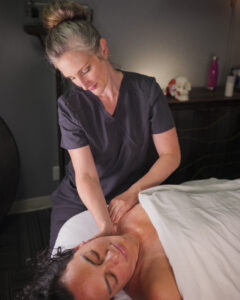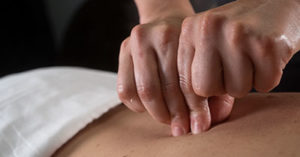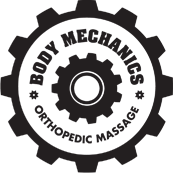In today’s fast-paced world, mental health challenges like anxiety and depression are increasingly common. Traditional treatments such as medication and therapy play a crucial role in managing these conditions, but adding in complementary therapies such as massage therapy can support your heath care and amplify it. This blog explores how regular massage sessions can help manage anxiety and depression as mental health conditions, providing a holistic approach to well-being.
Understanding Anxiety and Depression

Anxiety and depression are complex mental health disorders that affect millions worldwide. Anxiety is characterized by excessive worry, fear, and apprehension. It is normal to have some worries some times.
The National Institute of Mental Health defines Anxiety disorders as a type of anxiety that “the anxiety does not go away and can get worse over time. The symptoms can interfere with daily activities such as job performance, schoolwork, and relationships.” https://www.nimh.nih.gov/health/topics/anxiety-disorders
Most people can feel depressed occasionally, but for some, those feelings persist. Depression involves persistent feelings of sadness, hopelessness, and a lack of interest in daily activities. To be diagnosed with this kind of depression, it must go on for at least 2 weeks. https://www.nimh.nih.gov/health/topics/depression
Both conditions can significantly impair an individual’s quality of life, impacting their emotional, physical, and social well-being.
For either of these things massage therapy might be a helpful choice.
If you are experiencing the nonclinical versions of anxiety or depression,massage might be an excellent way for you to help manage your occasional anxiety or sadness.
If you fall into the clinical category of either of these two, massage might be a significant addition to your medical team. It should never replace your medical care as these are serious conditions, but instead be used to amplify it and support it.
How Massage Therapy Helps Anxiety and Depression
For many massage is seen as a luxury, and it certainly can be, but it also holds a place at the table for health care in helping people cope with anxiety, pain, and depression. Below we will take a look at the science but it is important to understand that touch is hard wired into the human experience and that when you book a massage you are having someone care for you exclusively for an hour. This is part of our nature in terms of human grooming rituals.
Take a look at this wonderful article by the BBC on the nature of touch and how important it is to us as a social construct and part of our innate wellness:
“Human behaviours that involve physical social contact have a lot more in common with social grooming activities we typically associate with other species than we might initially think…..According to anthropologist Robin Dunbar, this works because grooming stimulates the release of endorphins – opiates produced by the brain that trigger feelings of relaxation by lowering the heart rate, reducing overt nervous behaviours like scratching, and even bringing on sleep.” https://www.bbc.com/future/article/20131014-the-touching-moments-we-all-need
Points to note:
- Reduces Stress Hormones
Massage therapy has been shown to lower cortisol levels, the stress hormone often elevated in individuals with anxiety and depression. High cortisol levels can lead to various physical and mental health issues, including increased anxiety and depressive symptoms. By reducing cortisol, massage helps decrease overall stress levels, providing relief from the constant state of tension and worry. - Increases Serotonin and Dopamine
Serotonin and dopamine are neurotransmitters that play a crucial role in regulating mood and emotional well-being. Individuals with depression often have lower levels of these “feel-good” hormones. Massage therapy stimulates the production of serotonin and dopamine, improving mood, enhancing feelings of pleasure, and promoting a sense of well-being. This biochemical change can significantly impact the overall mental health of individuals dealing with anxiety and depression. - Release endorphins– Further, social grooming also releases beta-endorphins, which promote physiological responses in stress reduction. These responses can occur from the production of hormones and endorphins or through the growth or reduction in nerve structures. https://en.wikipedia.org/wiki/Social_grooming
- Promotes Relaxation
The physical touch and soothing environment of a massage session can induce a state of deep relaxation. This can help alleviate anxiety symptoms, providing a break from the constant mental stress and allowing the mind and body to reset. Techniques such as Swedish massage, with its gentle and rhythmic strokes, are particularly effective in promoting relaxation and reducing stress. - Improves Sleep
Sleep disturbances are common in individuals with anxiety and depression, exacerbating their symptoms and impacting their overall health. Massage therapy can improve sleep quality by promoting relaxation, reducing physical discomfort, and calming the nervous system. Better sleep quality leads to improved mood, energy levels, and cognitive function, which are essential for managing anxiety and depression. - Enhances Mind-Body Connection
Massage encourages mindfulness and body awareness, helping individuals become more attuned to their physical and emotional states. This heightened awareness can be beneficial in managing anxiety and depression, as it allows individuals to recognize early signs of stress and employ coping strategies more effectively. Techniques such as Geriatric Massage can help individuals connect with their bodies, promoting a sense of grounding and stability.
The role of Pain in Anxiety and Depression
People who manage pain long term, such as chronic pain or what we call persistent pain, are at higher risk for anxiety and depression. They also tend to feel pain more acutely due to the the interconnectedness of the nervous system.
When you manage chronic pain, you may also not be living your life to the fullest, causing you to miss out on social activities, exercise, and things that you find important for your mental well-being. These things combined with the physical stress of manageing the sensation of pain put you at a higher risk factor for anxiety and depression. About 65% of patients seeking help for depression also report at least one type of pain symptom. Psychiatric disorders not only contribute to pain intensity but also to increased risk of disability.https://www.health.harvard.edu/mind-and-mood/pain-anxiety-and-depression
Massage therapy can be an excellent management tool to help you feel better and reduce your risk factors.

Choosing the Right Massage
Different massage techniques can be more effective for managing mental health:
- Swedish Massage: Known for its gentle and soothing strokes, Swedish massage is excellent for relaxation and stress relief.
- Deep Tissue Massage: Helps release chronic muscle tension, which is often linked to anxiety.
- Therapeutic Massage: Focuses on addressing specific physical and mental health issues, offering a more personalized approach to treatment.
- Geriatric Massage: Tailored to the needs of older adults, focusing on promoting relaxation, improving circulation, and enhancing overall well-being.
Remember a massage does not need to fit into one of these categories to be considered helpful. it just must fit your preferences.
Conclusion
While massage therapy is not a standalone treatment for anxiety and depression, it offers significant benefits when used alongside traditional therapies. Regular massage sessions can reduce stress, improve mood, promote relaxation, enhance sleep quality, and foster a better mind-body connection. If you are experiencing anxiety or depression, consider incorporating massage therapy into your wellness routine to support your mental health journey.
If you’re interested in exploring the benefits of massage therapy for managing anxiety and depression, contact Body Mechanics NYC to schedule a session with our experienced therapists. Your path to better mental health could start with a simple touch.
Disclaimer: Always consult with a healthcare professional before starting any new treatment for anxiety or depression. Massage therapy should complement, not replace, traditional medical approaches.
